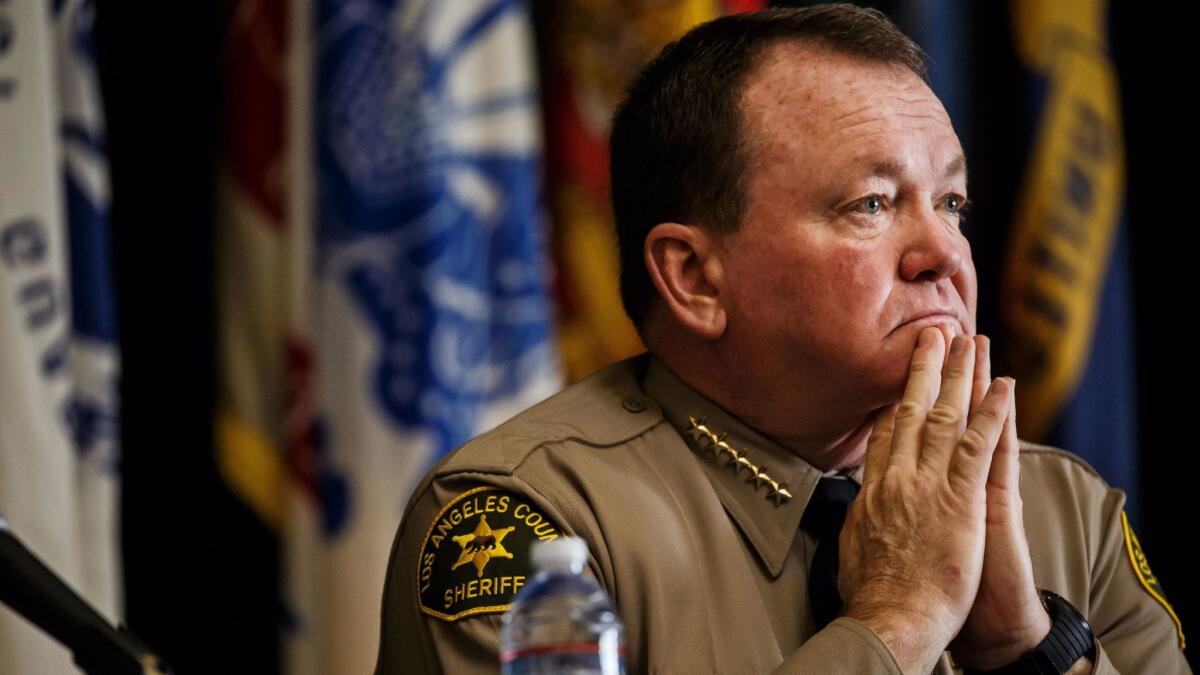State Supreme Court to decide if L.A. County sheriff can give names of problem deputies to prosecutors

- Share via
The debate over a secret list of 300 Los Angeles County sheriff’s deputies with histories of dishonesty or similar misconduct is now before the California Supreme Court.
In an order filed Wednesday, the court said it would consider an appeal made by Sheriff Jim McDonnell in his attempt to reveal to prosecutors the names of deputies whose past wrongdoing could call into question their credibility as witnesses in criminal proceedings.
The announcement is the latest turn in a closely watched case pitting the privacy rights of law enforcement officers against the rights of criminal defendants. The issue has inspired an unusual alliance between professional associations representing some public defenders and prosecutors in California — as well as state Atty. Gen. Xavier Becerra and the American Civil Liberties Union of Southern California — all of whom are publicly supporting McDonnell’s position in the case.
The legal battle began a year ago when the union that represents rank-and-file deputies in L.A. County went to court to block McDonnell from giving the list to prosecutors, arguing that doing so would violate state officer confidentiality laws and cast an unfair light on deputies whose mistakes were long ago.
The list identifies deputies found by internal investigators to have committed acts of “moral turpitude” such as lying, falsifying evidence, stealing and domestic abuse.
The issue before the state Supreme Court is whether McDonnell can give the name and employee number of a deputy with misconduct to prosecutors if that deputy is a potential witness in a pending criminal prosecution.
In July, a divided three-judge panel of the state’s 2nd District Court of Appeal held that the names are confidential and barred McDonnell from sending the names to prosecutors even in pending cases in which the deputy is expected to testify.
A high court ruling would only address whether the deputies’ identities would be revealed to prosecutors, not whether they would become public.
California has some of the strongest protections on law enforcement officer records in the country. Discipline hearings, personnel files and even the names of officers investigated by internal affairs are secret.
Police agencies in at least 22 counties across the state regularly give local prosecutors the names of officers found in internal investigations to have committed certain types of misconduct as part of the prosecution team’s so-called “Brady obligation,” according to the California District Attorneys Assn., which sent a letter in support of McDonnell to the high court.
The 1963 U.S. Supreme Court decision in Brady vs. Maryland obligates prosecutors to turn over evidence favorable to defendants, which could include information that undermines an officer’s credibility.
“We have just learned that the Supreme Court of California will review the merits of our appeal,” McDonnell said in a statement Wednesday night. “I have heard from law enforcement across the state and all eyes are upon the court as we seek the legal clarity we need to move forward.”
The Assn. for Los Angeles Deputy Sheriffs has argued that disclosure of the list to prosecutors violates the state’s police confidentiality laws, and that the appellate court’s recent decision does not impair a defendant’s right to a fair trial.
Elizabeth Gibbons, an attorney for the deputies union, has previously said that deputies on the list should not be seen as “problematic” because some are exemplary officers who have made minor mistakes in the past. She did not immediately respond to a request for comment.
“I am confident the court will conclude the sheriff may turn over the list to the district attorney,” said Peter Eliasberg, chief counsel for the ACLU of Southern California. He predicted the court could find that the transfer doesn’t conflict with state officer confidentiality laws or that the Brady decision requires the district attorney to have the names.
The state Supreme Court ruled in an unrelated case in 2015 that the San Francisco Police Department acted “laudably” by sending the names of officers with potential credibility problems to prosecutors.
Twitter: @mayalau
UPDATES:
6:35 p.m.: This article was updated with background about the legal battle and a comment from Eliasberg.
This article was originally published at 4:45 p.m.
More to Read
Sign up for Essential California
The most important California stories and recommendations in your inbox every morning.
You may occasionally receive promotional content from the Los Angeles Times.














